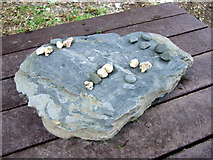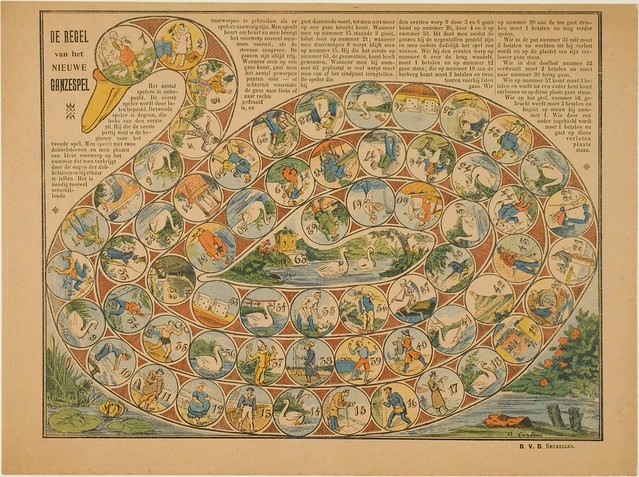Digital
games only cover a few decades of game history, so to investigate
games history with an in-depth understanding we need to delve way back in the past.
Our first experience of ancient games history started 2 weeks ago with British games history, Games Britannia. Games Britannia is a 3 episode series, presented by Benjamin Woolley, covering Britain's first games industry and games. The series history spans from the Iron Age to the Information Age.
Just to spoil anyone planning to watch
the series, here are some quick notes on what I found out after I
watched Games Britannia part 1, these notes do not cover everything.
There are three types of game:
From the Libro de Los Jeugos (Book of Games) commissioned by Alfonso X, a Castillian monarch from the east, Spain .
Chance
Fatalist, players submission to fate.
Skill
E.g chess, pertaining free will.
Combination
A game that balances chance and skill to imitate life.
Why do people play games?
People get bored so they play games or invent games to play to pass the time, it is ingrained in the human mind.
Nine Men's Morris
 |
| Nine Men's Morris at Nevern castle. Copyrighted but also licensed for further reuse, Photo by ceridwen |
Gambling
Dice was associated with the Devil.
Dice type games condemned by Church, "Calling the will of God to determine..." an action or choice.
Games that were covered: Faro, Hazard.
Gambling addiction, only now is recognized as an addiction, developed throughout the early ages.
Middle class opinion of games, "Games are for degenerates".
The first murder related to gaming was committed by Fertil, murdering his friend for a £300 gambling debt. Acts like this instated the Gaming Act 1845 in the UK, for later years the Gaming Act 2005.
Industrial Revolution
Industrial Revolution
- Introduced the first commercialised games
- Snakes and Ladders, originated from India, the game's original goal is to reach enlightenment and the progress through the game is a metaphor for "spiritual ascension".
- English adapted games, removing religious themes or elements, from different countries where they colonised, back to England.
 |
| The New Goose Game (c.1900). Copyrighted but also licensed for further reuse, photo by Peacay. |
Game of Goose
Features: Spinning top as a replacement for dice.
Point of game: To show how a person should behave, and to reach the goal of virtue.
My thoughts on the episode
I really liked the explanations of the 3 types of games, the Book of
Games stated the essentials of the types of games in ancient history. I
wish they showed more of the book, I will probably do a search for it
later on the Internet.
The
parts I was most interested in were: where games originated from and
why they were made. Some games were created to teach religion.Some
games diverged from the general "game" type, for example gambling from
the game of chance and evolved to include betting, then to include money
and real meaning to the game. I agree with Woolley's
explanation on why people play games, but it left me wondering if
betting can be really classed as a game; people don't really play
anything, they just bet money on if an event will happen, there is no
skill or meaning of development for the player. I guess it can be
classed as a game because it builds an experience of pleasure (or pain)
depending on the outcome and the player does have some choice.
The fact that a game had influence on reality, for someone to commit a
murder over is shocking but not unbelievable, such as the example of Fertil
and his gambling debt highlighted in the episode. Recently I have read
deaths of gang members, in Korea, relating to "Guild Feuds", where
players murdered rival guild members in the real world. Other types of games leave
people so consumed with it they pass out or die from not eating.
This addiction is not solely on gambling now, it is prevalent in all
types of games. On the bright side, games still have positive effects on
society: they create communities, educate, bring family and friends closer
together. Modern games create experiences in more advanced and fun
ways.
Games
are constantly expanding and diverging in to more different types, who
knows what the future of games will be like or what sort of
technology we will play them on. I certainly wouldn't mind playing naughts
and crosses on a misty window or on my friend's shiny Ipad, however it is easier to create it by hand rather than coding it.
Ref
Games Britannia, Dicing with Destiny
http://www.bbc.co.uk/programmes/b00p90d8
Ref
Games Britannia, Dicing with Destiny
http://www.bbc.co.uk/programmes/b00p90d8
Hi Gav,
ReplyDeleteNice summary, with independently sourced images.
You might like to try out an online version of nine men's morris:
http://merrelles.com/English.html
Also, in case you haven't yet tracked it down, I came across a translation of Alfonso's Book of Games here: http://www.scatoday.net/node/11707
Thanks Ed
ReplyDeleteI had a quick look at NMMs but the java refused to work, I probably need to install it on my new laptop. I scrolled down and the instructions for the game confused me, hopefully when I get this to work I can figure it out. I'm the sort of person that learns the rules as they play I guess.
Currently downloading BoG now! Thanks a lot, I appreciate the time you took on finding the file and I will enjoy reading this.
Had a quick go at NMM java, I really like it! VII is so difficult, once you think you have the upperhand on the AI the 3rd stage buggers you lol.
ReplyDeleteThe 3rd stage of the game kind of relates to the tools for creating dramatic tension, our class discussed it on Friday. The game uses force to keep the game close, by changing the game's state, e.g stage 3 adds rules to let the losing player move his pieces to any vacant spot.
In VII difficult of the game, I swear I caught the computer cheating since it moved a piece to a non-adjacent spot when it still had over 3 pieces left.
There's a game called Kensington, invented in the 1970s, which is a variation on Nine Mens' Morris:
ReplyDeletehttp://boardgamegeek.com/boardgame/2197/kensington
This comment has been removed by a blog administrator.
ReplyDelete